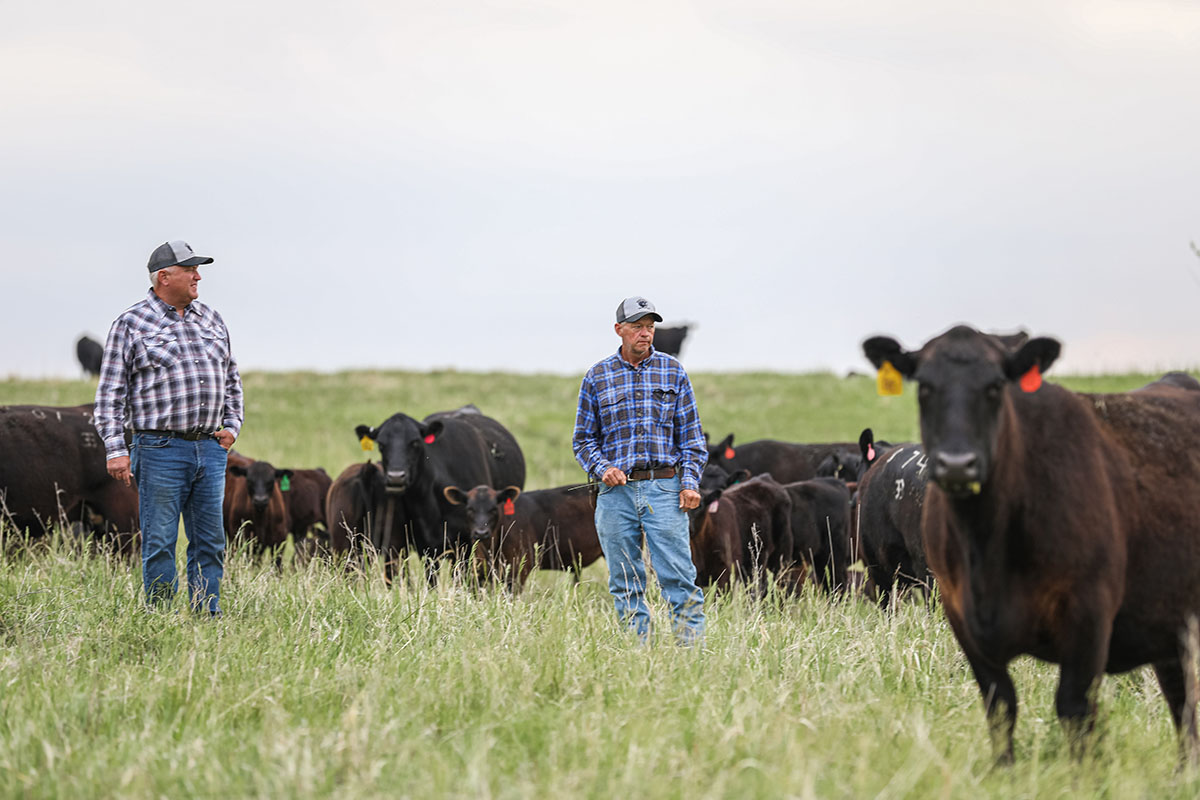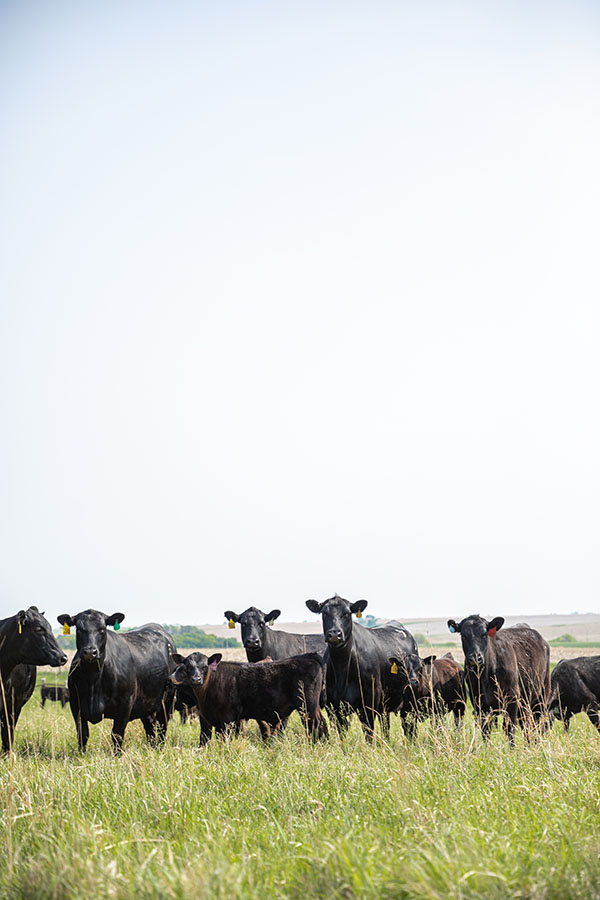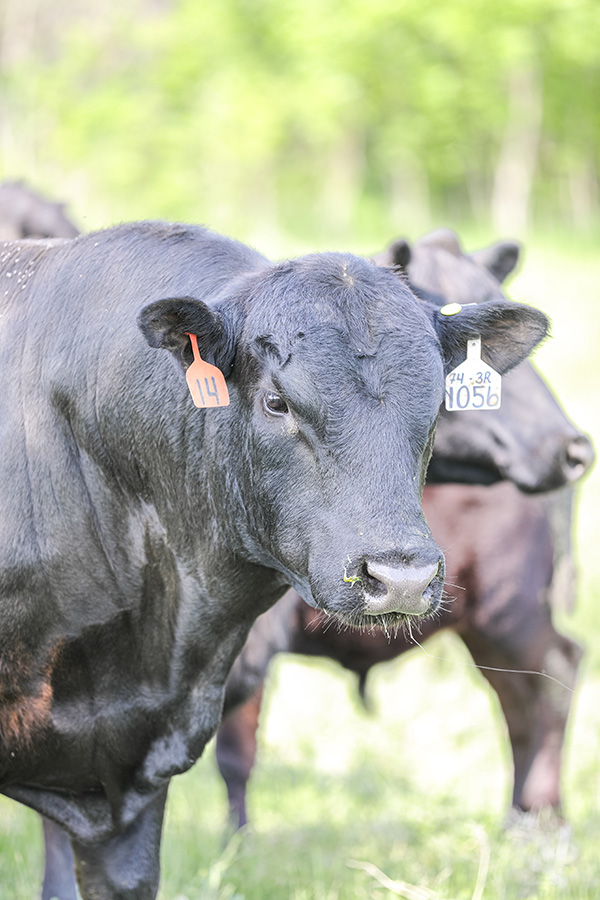
From the Ground Up
Benoit Angus Ranch honored with CAB Seedstock Commitment to Excellence Award.
By: Lindsay Graber Runft, Director of Producer Communications
October 2023
Fresh out of the Army and with an eye for the right kind of cattle, Everett Benoit bought six Angus heifers from his neighbor and started a cow herd of his own. He and wife Bonnie settled down in north-central Kansas to build a farm and family. The only kind of work they knew was hard work, and plenty of it.
Construction work helped Everett save enough to buy ground and gradually grow the herd. Land prices back then look cheap now, but it was a large investment in the family’s future.
Everett’s dad warned he’d “go broke,” but determined and set on raising Angus cattle, the young man pressed on figuring, “You know, I’m already broke.”
That resolve and work ethic saw the herd grow to 400 Angus females, along with a 2,500-acre farming division now.
Benoit Angus Ranch, a seedstock operation that markets more than 150 bulls annually, is a multi-generation family business with sons Doug and Chad now heavily involved. Focused on serving the commercial cattleman, the Benoits built a reputation for high-quality cattle that perform on the ranch, in the feedyard and on the rail.
With always-improving cattle to support that renown, and the will to back it up, Benoit Angus Ranch earned the Certified Angus Beef (CAB) 2023 Seedstock Commitment to Excellence Award. The family was recognized at the CAB Annual Conference in Las Vegas, Nevada, in September.
Caption: (left to right): Chad, Everett and Doug Benoit
Family and the Farm
Three generations of family gather on Everett and Bonnie’s porch steps at day’s end. Laughter erupts as shared lives and love spill over the talk of a joined past, present and future. The two who started it all have always worked together in nearly every aspect. Cattle, chickens, hogs, and raising children.
“Oh, she hated the chickens,” Everett smiles at the memory.
The chickens and hogs are long gone, but Angus cattle and family are still a big part of the farm, with its headquarters where his parents Archie and Rosalie lived. Chad makes his home where he and four siblings were raised, while Doug and family live just down the road from his mom and dad.
The next generation of Benoit Angus lives and works close together.
“They (Doug and Chad) graduated from college and worked away from the farm,” Everett says. “They both called and wanted to know if they could come back. That was the best thing that ever happened.”
While Doug focuses on the cow herd, Chad oversees the farming side. Where possible, that’s tied back to the cattle as row crops, cover and forages diversify beyond managing 3,500 acres of grass. Cows graze corn stalks till late in the year and cover crops on wheat ground extend light grazing through the winter.
Everett and Bonnie remained involved, often sitting down with their sons to provide input and advice.
“My dad, he’s the main guy. Well, he and mom, both. They started this and now we all work together,” Doug says. “Dad has been a great teacher for us. And, it’s very nice to be able to work with your folks.”
Passing his work ethic, love for the breed and the core foundation of the family Angus herd on down to sons meant they grew up with Angus as the only logical choice.
“What does it mean for me to continue his legacy? It’d be something,” Doug says. “We’re just trying to keep it going. We work really hard at everything.”

Caption: Doug and Chad Benoit work diligently to build on the foundation laid before them, decades of hard work by their parents.
Love for the Angus Female
Recognized for their emphasis on maternal traits, the Benoits are known for overall high-quality Angus genetics.
“We just love our Angus cows,” Doug says. “They’ve all been good to us.”
That’s because of excellent husbandry, heavy culling and careful selection over the years, from numbers to pedigree and practicality.
To Doug, the Angus female is the ideal type, further refined for a feminine head and length of body.
And to Jeff Mafi, American Angus Association regional manager, the Benoit Angus herd is a functional, working set of cows.
“They look for females with a good phenotype, do-ability and the right udder,” he says. “But they know they are in the beef business, so they pay attention to carcass traits, too.”
Aiming for bulls that will meet a commercial cattlemen’s needs, the Benoits start with the mother cow. Falling right in line with maternal, Doug emphasizes the importance of “building a cow with thickness,” strong carcass traits and performance.
“We’re not focusing just on terminal cattle. We want to have both,” he says. “And I think our cattle can do both.”
Striving for excellence, the Benoits stress data collection and testing. The longtime Maternal Plus members document that side of performance in their herd. All replacement females and sale bulls are American Angus Association Genomic Selection (GS)-tested, with results applied to herd improvement and marketing.
“They’re no-nonsense Angus breeders,” says Mafi. “If the cattle won’t work for customers, they get rid of them.”


Customer-Focused Cattlemen
Any reputation is earned. In the cattle business it can be cultivated in many ways, but it hangs on customer opinion.
“We measure success by our customers,” Doug says. “We work for them, and we’ll do everything we can to keep them satisfied.”
With two annual production sales, females in the fall and bulls in the spring, the Benoits rely on a strong customer base, largely repeat buyers and upwards of 85% commercial.
Before their first bull sale at the ranch in 1990, they sold through the Beloit (Kansas) Bull Test.
“We had several customers that were going to the bull test,” Everett says. “Once we started having a sale, they followed us and helped us out.”
They’re still selling to some of those first customers who have purchased Benoit Angus bulls for decades.
“They seem like they’re satisfied,” Everett observes. “That’s the joy of it.”
Many customers sell calves at weaning or retain ownership at a feedyard. From the latter set, they may receive performance data.
With a goal to retain customers, the Benoits gladly take that feedback and use it to improve.
“There’s no fancy stuff that we try to do,” Doug says. “We just try to raise them like the commercial cattleman does, and we let the cattle work for them.”
Each year’s breeding decisions aim to improve the herd, partly by targeting high-quality beef production. With a bull customer base largely aiming for a premium on calves produced, the Benoits employ CAB’s “Targeting the BrandTM” logo in their sale catalogs. In 2023, 76% of their bull sale offering earned the logo.
“We put that Targeting the Brand mark in our sale catalog, and I know a number of customers will buy off that,” Doug says. “And they will mark out bulls from their selection if it doesn’t have the Targeting the Brand logo.”
Aside from customer reports, the Benoits monitor genetic improvement on their own accord through ultrasound scans on bulls and heifers, as well as retained ownership in a Nebraska feedyard.
As the first of two rounds of culling, the ranch pulls the bottom 25% of bulls based on quality, and sends them to the feedyard as steers. That bottom end, in a sense, still contributes carcass data as a baseline for how different genetics perform.
With an average CAB acceptance rate of nearly 65% along with those grading Prime, the Benoits have found what works.
Putting in the Work
“As long as it’s got a seat on it, I can usually do a pretty good job,” Everett says.
Now in his mid-80s, he wakes before sunrise and climbs into his truck for another day of work on the farm. Whether he’s feeding cows or swathing hay, he enjoys what he does from the seat. Bonnie still can’t plan on him for dinnertime, but they’ve managed to get along so far.
“If you love doing something, it’s not work,” Everett says. “That’s the way I taught my boys—and hard work, it pays off.”
For the Benoits, that’s the goal: Add quality to the cow herd and improve the quality of a steak.
With another generation (or two) following in his footsteps, and the success of the ranch to carry forward, one thing is for certain: hard work is a learned lifestyle at Benoit Angus Ranch.
This story was originally published in the Angus Journal.
You may also like
Marbling, Feet and Fertility: Are they related?
The Angus breed has enough genetic diversity to allow breeders, and their commercial bull customers, to make progress across multiple traits simultaneously. One bloodline may be high in marbling but does not check the boxes you need for other traits. That does not mean marbling is the cause—it simply means your search for the ideal genetic pairing is not done.
From Modest Beginnings to Excellence
Gilchrist Farm recently received the 2024 Certified Angus Beef Canadian Commitment to Excellence award. This prestigious honor recognizes their exceptional achievements in high-quality Angus genetics and management. Over the years, they have transformed their operation by embracing superior Angus genetics. Their commitment to high standards and innovative practices has distinguished them as a model of excellence in the industry.
From White House to Farmhouse
At Pleasant Valley Farm in Brookville, MD, four generations of the Stabler family have blended tradition and innovation to create a thriving, diversified Angus operation. Honored with the Ambassador Award at the 2024 Certified Angus Beef (CAB) Annual Conference, the Stablers exemplify a commitment to sustainable farming, community engagement and educational outreach. Their significant contributions to the hosting on behalf of the CAB brand highlight their commitment and play a key role in receiving this award.



